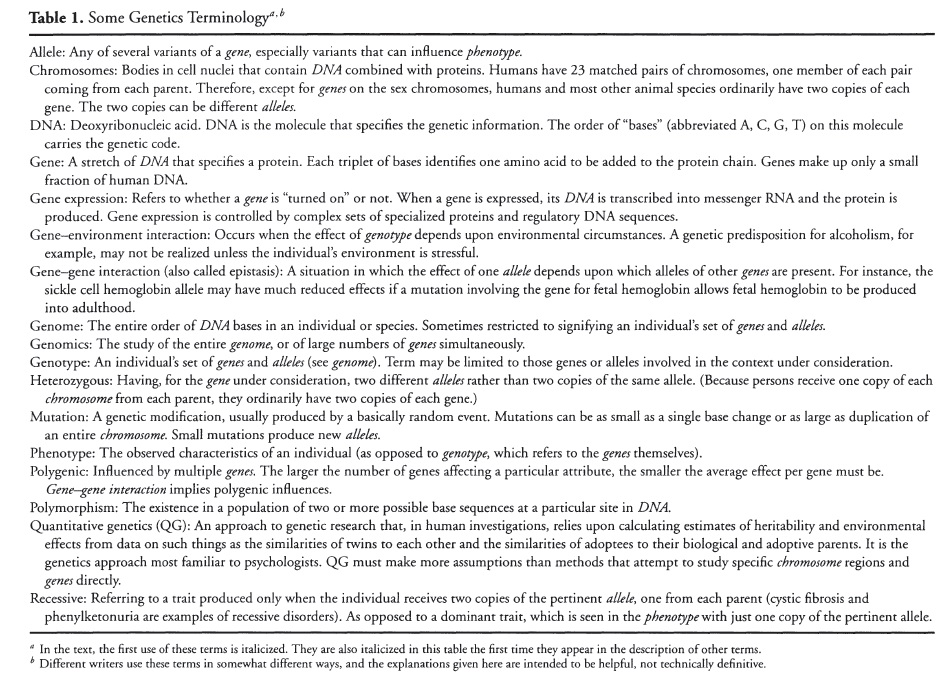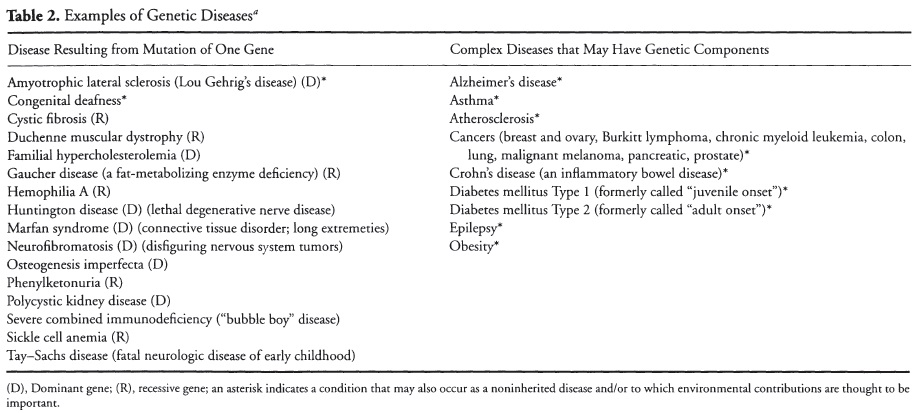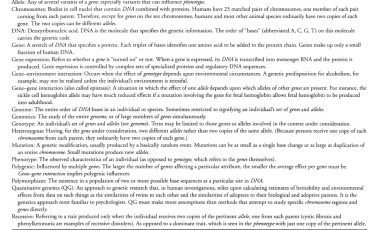Genetics affects virtually everything about living organisms. Psychology’s greatest involvement with genetics concerns genetic differences among people, and books such as Plomin et al.’s (2003) Behavioral Genetics in the Postgenomic Era embody that emphasis. In A Holistic Conceptualization of Stress and Disease, Newberry et al. (1991) detail the numerous pathways linking psychological variables to disease and note the broad role of genetics in questions relevant to health psychology.
Genetics Background
Table 1 explains genetics terms, which are italicized on first use in this entry. Texts such as Klug and Cummings’s (2002) Essentials of Genetics provide more detail. Genes arc DNA segments providing instructions for the production of proteins, and proteins direct virtually all aspects of organism structure and function. Protein production from a gene {gene expression) normally occurs only when the protein is needed. Genetic variation reflects mutations. Variants of individual genes are termed alleles, and the set of genes and alleles possessed by any organism is its genotype. Human genes are on 23 chromosome pairs, and with few exceptions we have two copies of each gene. Recessive alleles are not seen in the phenotype unless two copies are present.
Genetic influences are often subtle. The idea that there is “a” gene “for” a trait is extremely misleading. When traits are polygenic no single gene necessarily has a large influence. In gene-gene interaction (epistasis) a particular allele’s impact depends on the alleles of other genes. Moreover, genes can act quite indirectly: A “genetic effect” on television watching might really be an effect on shyness or athleticism.
One must also recognize that genetics and environment are often entangled. In gene—environment interaction, a genetic predisposition may produce the trait only under particular environmental conditions. Genes and environment can be correlated even when they are not causally related. For example, a seeming genetic influence on food preference could reflect distinctions between cultures whose members just happen to differ genetically. Table 1. Some Genetics Terminology
Table 1. Some Genetics Terminology
- Allele: Any of several variants of a gene, especially variants that can influence phenotype.
- Chromosomes: Bodies in cell nuclei that contain DNA combined with proteins. Humans have 23 matched pairs of chromosomes, one member of each pair coming from each parent. Therefore, except for genes on the sex chromosomes, humans and most other animal species ordinarily have two copies of each gene. The two copies can be different alleles.
- DNA: Deoxyribonucleic acid. DNA is the molecule that specifies the genetic information. The order of “bases” (abbreviated A, C, G, T) on this molecule carries the genetic code.
- Gene: A stretch of DNA that specifies a protein. Each triplet of bases identifies one amino acid to be added to the protein chain. Genes make up only a small fraction of human DNA.
- Gene expression: Refers to whether a gene is “turned on” or not. When a gene is expressed, its DNA is transcribed into messenger RNA and the protein is produced. Gene expression is controlled by complex sets of specialized proteins and regulatory DNA sequences. Gene-environment interaction: Occurs when the effect of genotype depends upon environmental circumstances. A genetic predisposition for alcoholism, for example, may not be realized unless the individual’s environment is stressful.
- Gene-gene interaction (also called epistasis): A situation in which the effect of one allele depends upon which alleles of other genes art present. For instance, the sickle cell hemoglobin allele may have much reduced effects if a mutation involving the gene for fetal hemoglobin allows fetal hemoglobin to be produced into adulthood.
- Genome: The entire order of DNA bases in an individual or species. Sometimes restricted to signifying an individual’s set of genes and alleles. Genomics: The study of the entire genome, or of large numbers of genes simultaneously.
- Genotype: An individual’s set of genes and alleles (see genome). Term may be limited to those genes or alleles involved in the context under consideration.
- Heterozygous: Having, for the gene under consideration, two different alleles rather than two copies of the same allele. (Because persons receive one copy of each chromosome from each parent, they ordinarily have two copies of each gene.)
- Mutation: A genetic modification, usually produced by a basically random event. Mutations can be as small as a single base change or as large as duplication of an entire chromosome. Small mutations produce new alleles.
- Phenotype: The observed characteristics of an individual (as opposed to genotype, which refers to the genes themselves).
- Polygenic: Influenced by multiple genes. The larger the number of genes affecting a particular attribute, the smaller the average effect per gene must be. Gene—gene interaction implies polygenic influences. Polymorphism: The existence in a population of two or more possible base sequences at a particular site in DNA.
- Quantitative genetics (QG): An approach to genetic research that, in human investigations, relies upon calculating estimates of heritability and environmental effects from data on such things as the similarities of twins to each other and the similarities of adoptees to their biological and adoptive parents. It is the genetics approach most familiar to psychologists. QG must make more assumptions than methods that attempt to study specific chromosome regions and genes directly.
- Recessive: Referring to a trait produced only when the individual receives two copies of the pertinent allele, one from each parent (cystic fibrosis and phenylketonuria are examples of recessive disorders). As opposed to a dominant trait, which is seen in the phenotype with just one copy of the pertinent allele.
These intricacies vastly complicate efforts to understand human genetics. Few if any analyses have yet been able to deal adequately with all of the factors that operate in polygenic inheritance. Many claims about genetic effects, particularly if based upon simple quantitative genetics (QG) results, are decidedly preliminary. Still, much is known about relatively simple situations. Important initial evidence on more complex issues and new technology stemming from the Human Genome Project promise rapid progress.
Genetics and Disease
 For hundreds of diseases, certain genotypes confer increased susceptibility. Massimini (2000) provides a thorough treatment in Genetic Disorders Sourcebook.] Genetic contributions may be of many types. Sometimes, as in cystic fibrosis and sickle cell disease, single abnormal alleles more or less directly produce the condition. Other disorders (e.g., Type 2 diabetes and some heart diseases) are polygenic and/or involve indirect genetic influences. One potential indirect genetic influence involves stress reactivity. Some rat strains with genetically low stress hormone levels cannot combat inflammatory diseases such as arthritis. (Those strains may also differ in the sickness response that accompanies immune activation.) The molecular genetic abnormalities causing cancer (e.g., abnormal cell division signals) can represent mutations resulting from exposure to environmental carcinogens. Such genetic influences are acquired, not inherited.
For hundreds of diseases, certain genotypes confer increased susceptibility. Massimini (2000) provides a thorough treatment in Genetic Disorders Sourcebook.] Genetic contributions may be of many types. Sometimes, as in cystic fibrosis and sickle cell disease, single abnormal alleles more or less directly produce the condition. Other disorders (e.g., Type 2 diabetes and some heart diseases) are polygenic and/or involve indirect genetic influences. One potential indirect genetic influence involves stress reactivity. Some rat strains with genetically low stress hormone levels cannot combat inflammatory diseases such as arthritis. (Those strains may also differ in the sickness response that accompanies immune activation.) The molecular genetic abnormalities causing cancer (e.g., abnormal cell division signals) can represent mutations resulting from exposure to environmental carcinogens. Such genetic influences are acquired, not inherited.
Reactions to medications are another way in which genotype influences disease. Both therapeutic benefits and side effects can be affected. Increased toxicity occurs with genetic deficiencies in the enzymes that metabolize the anticancer drug mercaptopurine, for example. The anticlotting drug warfarin can cause bleeding when its primary “detoxifying” enzyme is produced at a low level. As an example from the benefit side, positive response to lipid-lowering medications called “statins” has been associated with polymorphisms predicting atherosclerosis risk. Such effects are complex, but pharmacogenomics should eventually allow tailoring drug therapy to individual patients, providing improved treatment and, of particular significance to health psychology, improved patient compliance.
Even when diseases have clear genetic bases, environmental influences and psychological factors can modify outcomes. A genetic predisposition to Type 2 diabetes, for instance, need not produce disease in persons whose circumstances require high activity levels and preclude overeating; geneotype and environment interact. The present epidemic of obesity and the increased Type 2 diabetes among American youth are not surprising.
Genetics and Health-Relevant Psychological/Behavioral Variables
As Plomin and colleagues stress, and QG studies support, it is reasonable to suspect that many major psychological individual differences (in skills/abilities and personality/temperament) are genetic to some degree. However, all of the complexities regarding genetic effects apply. Attempts to identify specific genes have been disappointing, though there are good leads. Genes coding for proteins that regulate the actions of the neurotransmitters serotonin and dopamine have been associated with anxiety, depression, and change seeking, though the results are not consistent. There are some data suggesting that gene-gene interactions may contribute to the inconsistencies.
Like all behavior, health behavior (e.g., diet choices, exercise, health care utilization) is probably genetically influenced, perhaps via personality and abilities. Thus behavior can be an indirect means by which genotype leads to disease. To the extent that culture/subculture is affected by—not merely associated with—genetics, genetic effects on health behavior could be produced through social influences.
The health belief model, described in texts such as Taylors (1999) Health Psychology, provides a useful perspective. In this view, practicing a particular health behavior depends on perceived personal health threat (risk and severity) and judgment that a health behavior will be effective. Those who believe that they are at risk, that a particular health behavior will work, and that they can change their behavior are most likely to engage in that health behavior. Because people tend, often incorrectly, to equate “genetic” with “unmodifiable,” they are particularly likely to see genetic risks as insurmountable.
Genetic Testing
Genetic testing is an increasingly important means of assessing health risks. DNA tests exist for many disorders, and more are becoming available. When a disorder has a simple monogenetic basis, the tests are quite predictive. When multiple genes and/or environmental effects are involved, or when the critical gene is recessive, they are necessarily less predictive and may not offer the hoped-for reduction in uncertainty. Tests for BRCA1/BRCA2 are currently receiving much attention. Alleles of these genes rather strongly predict early-onset breast and ovarian cancer.
Psychological considerations in testing for disease risk include decisions to get testing and reactions to test results. These issues may be understood, in part, via health beliefs. The thought that one has a family history of a particular disease should increase perceived health threat and therefore the motivation for such health behaviors as seeking testing. A study by Shaw and Bassi (2001) generally supports the health belief model. However, knowledge can be distressing, and some persons may cope with the stress of possible genetic disease by avoiding information about their risk. This disengagement strategy is associated with genetically influenced personality variables and, consistent with the health belief model, with the absence of effective interventions.
Reactions to positive tests reflect some of the same factors as decisions to undergo testing. Positive results, especially for serious, genetically simple conditions must almost automatically be stressful. From the health belief perspective, once risk is established, coping becomes the issue. Whether an individual takes action or slips into fatalistic thinking should depend upon the person’s perception that their behavior could alter the threat, by belief that they can perform the necessary behaviors, and by individual psychological differences.
Another issue regarding genetic testing is the possibility that risk information will be accessed by employers or insurers, resulting in discrimination. That possibility further increases the worry some feel about testing, as Shaw and Bassi (2001) note, and creates a sense in the medical community that the risks of testing need to be considered carefully.
Genetic Counseling
Genetic counseling helps people understand genetic conditions. Counselors serve parents who might pass traits on to children and persons concerned about their own status. Much of the counseling involves explanation of the genetic “odds,” but counselors also deal with patient distress (including helplessness that may stem from seeing genetic risk as uncontrollable), refer them to support services, and serve as patient advocates. Weil’s (2000) Psychosocial Genetic Counseling provides a general introduction to psychological issues in the field.
Genetic counselors have specialized graduate degrees and have studied both medical genetics and counseling practice. They come to the field from many undergraduate backgrounds, including psychology.
Conclusions
Genetic effects are complex as well as extensive. For health psychology, one consequence of genetic effects is their implication for research results. The relationships of stress, coping, personality, and health behavior to each other and to disease will be affected by genetics. For clinical health psychology practice, the issues also include the relevance of particular assessments and interventions for particular patients. It is easy, for instance, to imagine collaborations between clinical health psychologists and genetic counselors. Furthermore, health psychology can make significant contributions to the study of human genetics/genomics by identifying important variables for investigation and by contributing to the interpretation of research findings.

Leave a Reply